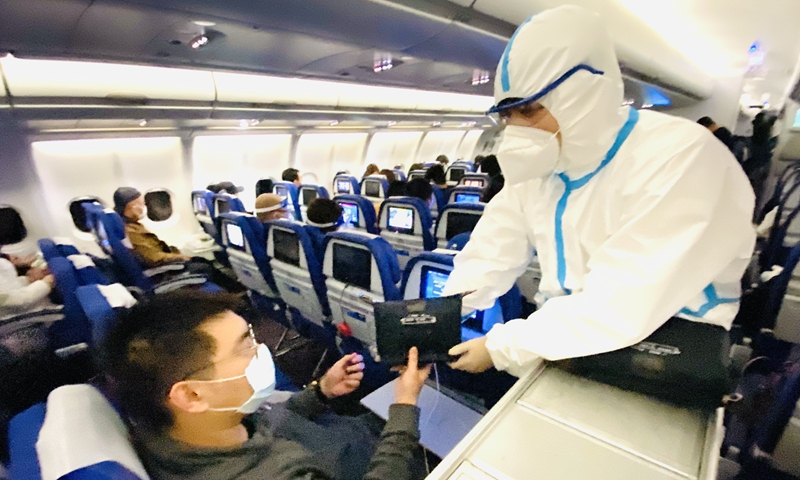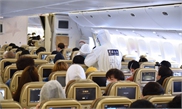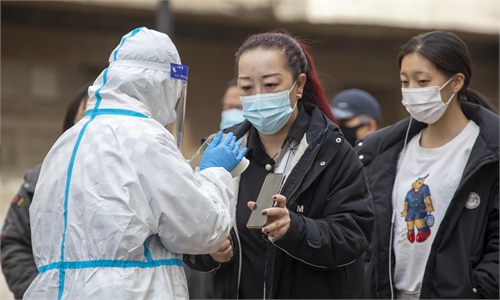
China Southern staff distribute limited edition pandemic prevention kits to passengers on some international flights to China. Photo: Courtesy of China Southern
China has adjusted its pre-departure requirement for overseas travelers as announcements from multiple Chinese embassies, including the Chinese Embassy in the US, show that some previously required pre-departure tests have been removed, including nucleic acid testing one or two weeks prior to boarding, mandatory health monitoring and IgM antibody testing.
The policy change takes into account the characteristics of the latest prevalent Omicron mutant strain, and is unlikely to pose a risk to China's domestic COVID-19 fight, experts told the Global Times.
Under the newly adjusted rules, people traveling to China will only be required to complete two nucleic acid tests within 48 hours before boarding and one antigen test within 12 hours before boarding. Those who test negative will be given a health code and allowed to board the plane. There will be no additional requirements for those who have recovered from infections.
In addition to the Chinese Embassy in the US, the Chinese Embassies in the UAE, Netherlands, Ireland, Denmark, Serbia, and Rwanda have issued similar adjustments to the requirements for travel to China from these countries.
In particular, the embassy in the UAE removed the requirement for two nucleic acid tests 21 and 14 days prior to travel and the requirement for CT testing for recovered patients, and the embassy in Serbia removed the requirement for a health code application for those who have been vaccinated for less than 14 days.
Such adjustments largely take into account the transmission characteristics of the Omicron variant strain and rising vaccination rates, immunology experts told the Global Times.
The incubation period for infections caused by Omicron is short, and the incubation period for the latest Omicron variants is as short as two or three days, Guangzhou-based immunologist Zhuang Shilihe told the Global Times on Wednesday, meaning that test results within 48 hours before departure are sufficient compared to nucleic acid tests seven or 14 days before departure.
"It has also reached a stage where the vaccination rate of Chinese nationals overseas, especially students, is already high, which is the basis for reducing the frequency of testing and the duration of quarantine," Zhuang said.
When sticking to the dynamic zero-COVID policy, which epidemiologists believe best suits China, the government has tweaked several times the COVID-19 playbook to optimize the antivirus measures.
Beijing already announced the official implementation of the shortened quarantine policy in early May.
Shortening quarantine time was made based on the fact that the incubation period of the Omicron variant is shorter than that of pervious variants, an expert from the Chinese Center for Disease Control and Prevention (CDC) told the Global Times on condition of anonymity. He noted that it is also to relieve the pressure of quarantine on medical and facility resources, and that the result of this policy will provide reference for the further easing of COVID-19 measures.
Considering the short incubation period and mild symptoms of Omicron, the adjusted pre-entry testing and post-entry isolation are not expected to have a significant impact on the domestic epidemic prevention situation in China, Zhuang noted.



